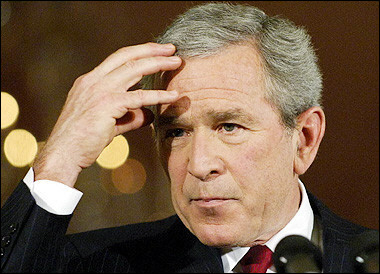|
Bush vigorously defends domestic spying
(AP)
Updated: 2005-12-20 09:01 Reid fired back: "The president and the Republican leadership should stop
playing politics with the Patriot Act," he said in a statement that added he and
other Democrats favor a three-month extension of the expiring law to allow time
for a long-term compromise.
The legislation has cleared the House but Senate Democrats have blocked final
passage and its prospects are uncertain in the congressional session's final
days. Scolded by Bush, key lawmakers reopened talks by setting out the rough
parameters of a deal: Extending the act for one to four years.
Bush said the electronic eavesdropping program, conducted by the National
Security Agency, lets the government move faster than the standard practice of
seeking a court-authorized warrant under the Foreign Intelligence Surveillance
Act. "We've got to be fast on our feet, quick to detect and prevent," the
president said.

US President George W. Bush speaks during a
press conference in the East Room of the White House, in Washington, DC.
[AFP] | The president said the authority to bypass
the court derived from the Constitution and Congress' vote authorizing the use
of military force after the 2001 terror attacks.
"I can fully understand why members of Congress are expressing concerns about
civil liberties," the president said. "I want to make sure the American people
understand, however, that we have an obligation to protect you, and we're doing
that, and at the same time, protecting your civil liberties."
Former Senate Democratic leader Tom Daschle said he was briefed by the White
House between 2002 and 2004 but was not told key details about the scope of the
program. "Even with some of the more troublesome 錕斤拷 and potentially illegal 錕斤拷
details omitted, I still raised significant concern about these actions,"
Daschle said.
Daschle's successor, Reid, said he received a single briefing earlier this
year and that important details were withheld. "We need to investigate this
program and the president's legal authority to carry it out," Reid said.
Senate Intelligence Chairman Pat Roberts has been regularly briefed and
believes the program is consistent with U.S. laws and the Constitution, his
office said. A statement said he was talking with Senate leaders about how to
expand Congress' oversight.
Bush was cool toward investigations, saying, "An open debate would say to the
enemy, `Here is what we're going to do.' And this is an enemy which adjusts." He
said the administration had consulted with Congress more than a dozen times.
On another issue, Bush acknowledged that a pre-war failure of intelligence 錕斤拷
claiming Saddam Hussein possessed weapons of mass destruction 錕斤拷 has complicated
the U.S. ability to confront other potential emerging threats such as Iran.
"Where it is going to be most difficult to make the case is in the public
arena," Bush said. "People will say, if we're trying to make the case on Iran,
`Well, if the intelligence failed in Iraq, therefore, how can we trust the
intelligence on Iran?'"
|